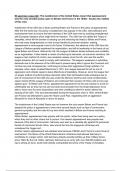IR specimen essay Q4: ‘The isolationism of the United States meant that appeasement
was the only sensible policy open to Britain and France in the 1930s.’ Assess the validity
of this view
Isolationism of the USA was a factor pushing Britain and France to the policy of appeasement.
After the first world war, the policy of isolationism was popular in the USA, with politicians and
businessmen keen to ensure the best interests of the USA were met by avoiding entanglement
with European relations which might limit her freedom. The USA had not ratified the Treaty of
Versailles, which left the burden of carrying out and enforcing the treaty to Britain and France,
who had many disagreements on how to best handle the post-war situation, making
appeasement a more popular route in the future. Furthemore, the absence of the USA from the
League of Nations greatly weakened the organization, and left its leadership in the hands of yet
again Britain and France. Without the US, the League of Nations lacked authority and credibility
as an organization. It also lacked a means of enforcing its demands, as economic sanctions, the
league’s main method of control, was rendered useless since the US, who was the world’s
largest producer, did not need to comply with restrictions. The league’s weakness in upholding
demands due to the absence of the USA lead to powers being able to ignore the Covenant and
not face any real consequences, continuing to pursue their aggressive foreign policies. For
example, when Japan invaded Manchuria in 1931, the League deemed the act as one of
aggression and ordered Japan to leave Manchuria immediately. However, since the league had
no proper method of enforcing these demands other than half-hearted trade embargos due to
lack of involvement of the USA who was under the Stimson doctrine and moral condemnation,
Japan merely left the League of Nations and continued their invasion of China until a truce was
agreed upon. To Britain and France, appeasement appeared to be the only solution to avoid an
unthinkable war as they had not yet recovered economically from the Great depression to be
able to have room for arms expenditure and were unwilling to take firm action without the
backing of the USA. This was demonstrated during the Abyssinian crisis in 1935, where Britain
and France had attempted to pass the Hoare-Laval Pact, negotiating with an aggressive
Mussolini for most of Abyssinia in return for peace.
The isolationism of the United States was not however the only reason Britain and France had
adopted the policy of appeasement, there were several factors such as fear of communism,
genuine sympathy and the need to buy time which resulted in Britain and France resorting to
appeasement.
Within Britain, appeasement was popular with the public, rather than being seen as a policy
which they had no other choice but to pursue. One reason appeasement was popular was
because of the fear of communism. Germany was seen as a valuable ally against the perceived
threats of communist Soviet Union, who was at the time the bogeyman of Europe and
considered the ‘bigger evil’.
Another reason appeasement was adopted was because of Britain and France’s current level of
rearmament. The failure of the World Disarmament conference had allowed Germany to
remilitarise to a larger extent, with Germany already secretly building up their military forces
since 1929. By the mid 1930s, Germany had built up an army with over 300,000 soldiers and
had a strong air force, which both directly contradicted the terms of the Treaty of Versailles





